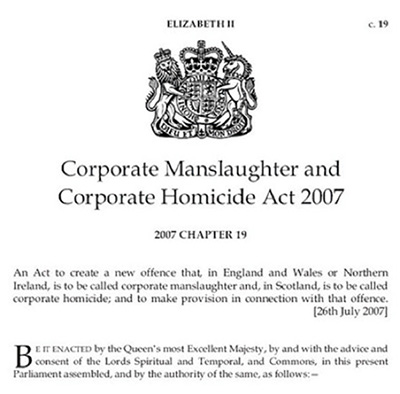What managers need to know about corporate manslaughter
Our legal advisers explore the implications for healthcare managers of the Maidstone corporate manslaughter case.

At the time when most hospital wards were taking down Christmas decorations and A&E departments were battling through the busiest time of the year, Maidstone and Tunbridge Wells NHS Trust was facing the challenge of being the first healthcare provider to be charged with corporate manslaughter.
Although the trial collapsed after just two weeks due to insufficient evidence, the case remains a stark warning to all healthcare managers.
The Corporate Manslaughter and Corporate Homicide Act 2007 came into force in April 2008 and was intended to make organisations accountable for serious management failings. The act removed the need to identify a senior individual who could be held to account for an offence of “gross negligence manslaughter”.
Corporate manslaughter is committed when a relevant organisation causes someone’s death through “the way its activities are managed and organised”, and when this amounts to “a gross breach of a relevant duty of care owed by the organisation to the deceased”.
Healthcare organisations owe patients a duty of care and that includes managing and organising their services in a safe and, where possible, controlled way. This duty is wide-ranging and can cover staffing levels, training, organisational structures and supervision, resources and equipment, and the condition of premises.
To give a topical example, strike action by junior doctors could make healthcare managers vulnerable under the Act. If deaths occur because of insufficient staffing, responsibility will fall squarely on the NHS trust, as the British Medical Association has given notice for trusts to re-arrange appointments or treatments.
What amounts to a “gross” breach is largely subjective. The Act expects the jury to decide “how serious the failure was” and “how much of a risk of death it posed”. However, the Act does allow juries to assess existing policies, health and safety guidance, accepted practices and other relevant documentary evidence in reaching a conclusion. So it’s vital that such documents are kept clear, simple and up-to-date.
The Act gives partial exemption from corporate manslaughter charges for services operating in “emergency circumstances” – defined as “circumstances that are present or imminent and are causing, or are likely to cause, serious harm or a worsening of such harm, or are likely to cause the death of a person”. However, healthcare providers, including ambulance trusts, should not be lulled into a false sense of security: the exemption does not apply to medical treatment being provided in an emergency, except for the process of triage and assessing the order in which patients should be treated.
On 1 September 2011 the scope of the Act was extended to include organisations which detain people, including mental health patients. This places a significant requirement on mental health trusts to make sure they manage and organise their services to be compliant.
Managers should hold regular audits of their safety management systems. These should be wide-ranging and include staff at all levels – managers need to know what is happening on the ground. A safety culture should be encouraged, focusing on good practice and fostering an ethos of learning from mistakes.
If you do find yourself involved in a corporate manslaughter case, early preparation and preservation of evidence is vital. Make sure you record first-hand accounts and properly preserve all relevant medical records. Criminal cases can take a long time to prepare, so make sure you retain records of policies which were in force at the time of the incident. Demonstrating clear processes and audit trails reduces the scope for a jury to apply a more subjective interpretation of events.
New Year is a great time to make resolutions, but make sure you follow up with a spring clean and check that all your policies and procedures are in good order, and understood and followed by all staff.
David Robinson is a serious injury solicitor at Thompsons Solicitors. Legal Eye does not offer legal advice on individual cases. MiP members in need of personal advice should immediately contact their MiP rep or national officer.
Related News
-

Constructive dismissal: understanding the pitfalls and exploring your options
Competing priorities, lack of support and stress at work leave some managers feeling they have no option but to resign. But in what circumstances could resignation amount to constructive dismissal? Jo Seery explains the law on constructive dismissal, the challenges it presents and the other options available.
-

A brief guide to race equality law: indirect discrimination
In the second part of our guide, Jo Seery explains how the law deals with indirect race discrimination and the evidence you need to build a case.
-

A brief guide to race equality law: direct discrimination
Jo Seery explains how the law deals with direct race discrimination in the workplace and the evidence you need to build a case.